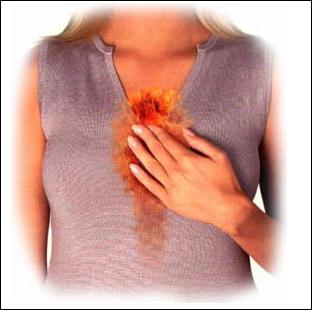Indigestion….it seems like a simple and harmless symptom that we may suffer from occasionally, but for some it has become a daily annoyance. In my practice I help people who’s indigestion is more than just an annoyance…it effects every moment of their day. Ranging from heartburn to painful bloating and diarrhea, my clients are desperate to find relief. Can you believe that over 30% of us suffer from one or multiple digestive issues? This may seem like a surprisingly high number, but indigestion isn’t usually seen as proper dinner conversation (except in my house) and most suffer in silence. Over the next few months I’m going to highlight different forms of indigestion and we’ll look at how they develop, how they affect the body, and how to reverse these symptoms. Let’s take it from the top and start with heartburn…otherwise known as Acid Reflux or GERD.
Many of us suffer from heartburn, and sadly, we’re led to believe that our acid levels are too high and we need to reduce the acid to find relief. The problem is the majority of heartburn symptoms are actually from having too little acid in the stomach.
There is a sphincter at the top of the stomach that closes when the stomach becomes very acidic (around a pH of 2). What happens to many of us is our stomach contents stay at a higher pH (i.e., around 4), which is still quite acidic, but not acidic enough to close this sphincter. All it takes is a bit of movement and the contents of our stomach splashes up.
Common symptoms of low stomach acid are:
- A heavy feeling in the upper abdomen after eating
- Heartburn and/or food traveling up the esophagus
- Acidic feeling stools
- Multiple mineral deficiencies – specifically calcium, iron, and zinc.
- Gas and bloating that aren’t helped with a good quality digestive enzyme.
Antacids provide temporary relief of the burning feeling and if used occasionally they don’t cause any harm to the body. Proton Pump Inhibitors (PPIs) are frequently prescribed for long-term heartburn sufferers and they work by “turning off” some of the acid production in the stomach. This stops the immediate symptom, but it makes the underlying issue more prominent – which is your stomach acid is too low.
Many with low stomach acid will find they have weak nails and/or hair, have trouble fighting off infections, develop seasonal allergies and immune reactions to foods (more on that in the next article), and develop multiple mineral deficiencies.
You may suddenly develop heartburn, but it’s a condition that develops over time, over decades of bad habits. The most common causes are:
- Eating quickly without chewing properly – when you overfill your stomach your digestive juices can’t keep up.
- Drinking liquids with meals – liquids dilute the acid in your stomach and this reduces the overall acidity.
- Eating while stressed or distracted – You’re either stressed OR you’re digesting. Stress “turns off” digestion so your body can react properly to stress.
- “Drinking” food – otherwise known as smoothies or protein drinks. Ever felt overfull or nauseated after a protein drink? The chewing motion in the jaw sends a signal to the stomach to start producing acid. No chewing = no acid production.
- Chewing gum – Chewing = acid production. But, this acid is wasted if you don’t swallow. Give your stomach a break and stop chewing gum!
Indigestion is more than just an annoyance, it’s a sign that you’re not digesting and assimilating your food properly. Every cell in your body is made from the food you eat, you really are what you eat, digest, and assimilate. A strong digestive system = a strong body.
Lisa Kilgour, Registered Holistic Nutritionist from EatMoreRealFood.com is a digestion specialist.
Lisa has clients from all over Canada and consults in person, and via phone and Skype. Contact Lisa today and take the first step towards good health!

